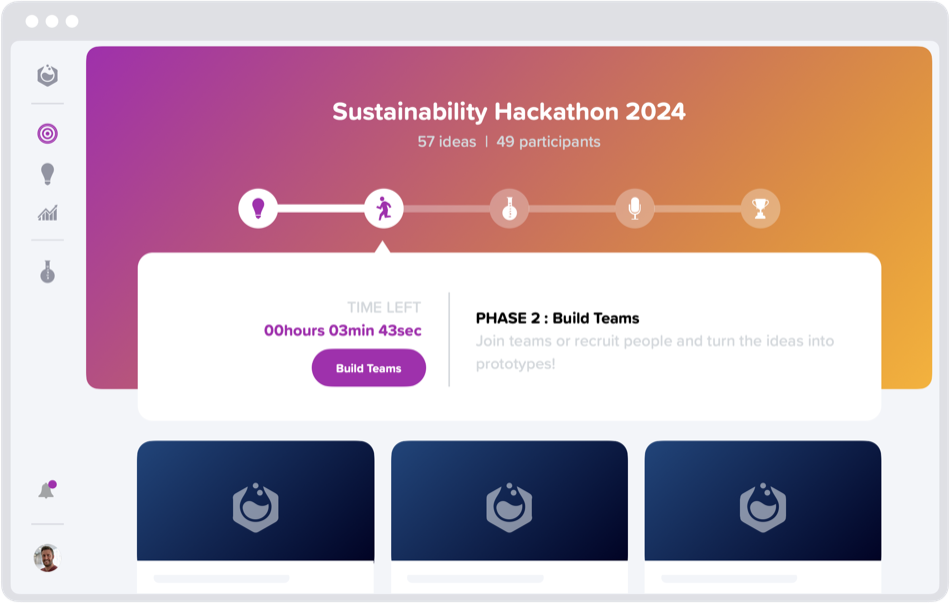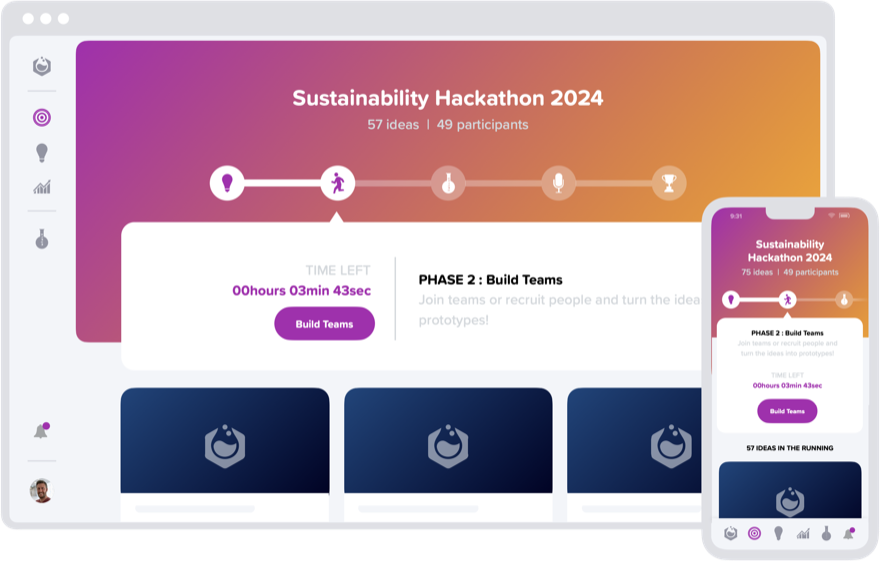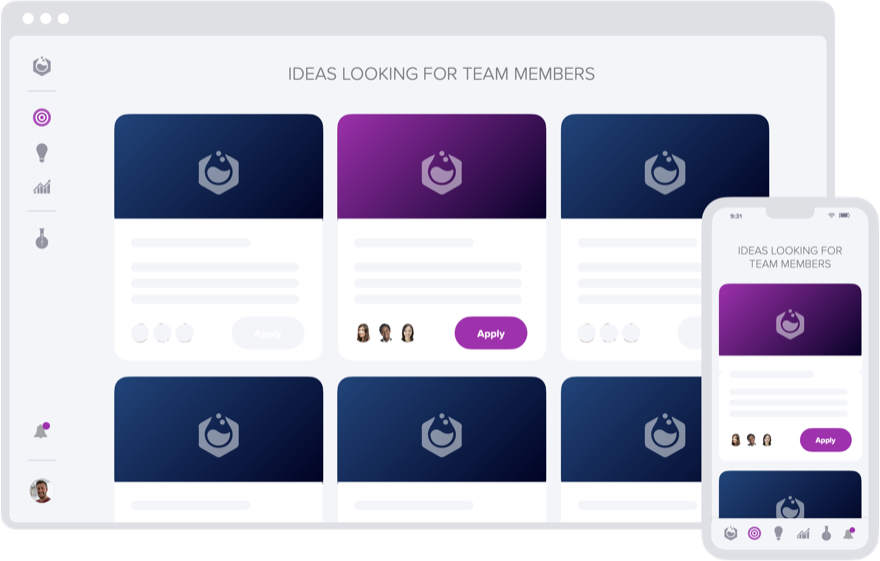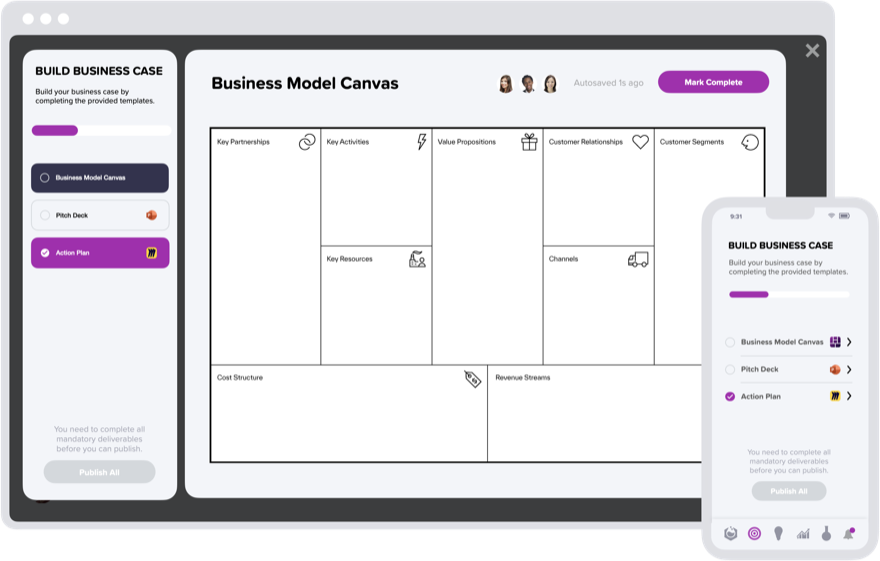
Hackathon Software
Hack the Now, Shape the Future
Yambla Hackathon Software helps companies harness the power of hackathons to drive innovation, collaboration, and creativity. With Yambla, organizing and executing hackathons has never been easier or more impactful.
- ✔ Try for free
- ✔ No credit card required
- ✔ Cancel anytime

Yambla simplifies the entire hackathon planning process, from setting goals and defining challenges to managing registrations and scheduling activities. Our intuitive platform ensures a smooth and efficient experience for organizers and participants alike. Foster cross-functional collaboration and teamwork with Yambla. Our platform provides built-in tools for brainstorming, idea sharing, and team formation, allowing participants to collaborate seamlessly throughout the hackathon.

Define Timelines
Define timelines for each stage of your ideation event, from idea generation to evaluation and implementation. Set deadlines, milestones, and checkpoints to keep your event on track and ensure timely progress. Select from a collection of timeline templates and customize it to fit your event's timeline and objectives.
Discover More Features →

Build Teams
Yambla provides built-in tools for team formation, making it easy for participants to connect with like-minded individuals and form cohesive idea teams. Whether you're joining an existing team or starting from scratch, our platform facilitates seamless collaboration and communication.
Discover More Features →

Complete Deliverables
Access a library of customizable templates designed to support various deliverables within the innovation process. From project plans and roadmaps to design briefs and experimentation frameworks, Yambla offers pre-designed templates that streamline the creation and execution of deliverables.
Discover More Features →
Other Highlighted Features
Rich Tooling
Built-in deliverable completion.
Automatic Content Translation
Bridge the language gap effortlessly and go global with ease.
Team Spotlight
Applaud the idea teams.
Measure Engagement
Are people engaging?
Microsoft Integration
Connect Microsoft Online to leverage MS Teams and MS Office functionality.
Miro Integration
Connect Miro to enrich ideas with online whiteboards.
Discover More Features →
Distinctly Us
Experience an exceptional product with even more exceptional customer service.
Hackathons Are Just The Beginning
Fuel innovation with one flexible solution, allowing you to launch any program format effortlessly.
Discover Our Product Suite →
What is a Hackathon?
A hackathon is an event or competition, typically held over a short period, where participants, often referred to as "hackers," come together to collaboratively work on innovative projects, develop new software, create prototypes, or solve specific challenges. While the name "hackathon" contains the term "hack," it doesn't necessarily imply illegal activities. In this context, "hack" refers to creative problem-solving and rapid prototyping.
Key characteristics of a hackathon include:
- Time Constraint: Hackathons are time-bound events, usually ranging from a few hours to a few days. Participants must work quickly and efficiently to develop their projects within the given timeframe.
- Theme or Challenge: Most hackathons have a specific theme or challenge that participants are expected to address. It could be related to technology, social issues, business problems, environmental concerns, or any other relevant topic.
- Collaborative Environment: Participants often work in teams, encouraging collaboration and knowledge sharing. The diversity of skills and backgrounds within a team enhances the potential for innovative solutions.
- Creativity and Innovation: Hackathons encourage out-of-the-box thinking and creative problem-solving. Participants are encouraged to experiment with new ideas and technologies.
- Rapid Prototyping: The primary goal of a hackathon is to produce a tangible outcome within the limited time available. Participants often create prototypes, minimum viable products (MVPs), or proof-of-concept demonstrations.
- Showcasing and Judging: At the end of the hackathon, teams typically present their projects to a panel of judges or the entire audience. Projects are evaluated based on criteria such as innovation, technical complexity, presentation, and potential impact.
Hackathons can focus on various areas, including software development, hardware hacking, data analysis, artificial intelligence, virtual reality, blockchain, and more. They are popular in the technology industry but are also organized in other sectors as a means of fostering creativity, teamwork, and problem-solving skills.
Hackathons are not only about competition; they also serve as opportunities for networking, learning from peers, and exploring potential career paths. Many successful startups have been born out of hackathon projects, and established companies often organize hackathons to discover fresh ideas and talent. Additionally, hackathons contribute to a vibrant and collaborative tech community, fostering a culture of innovation and continuous learning.
Powering Collaborative Innovation worldwide.
Get Started Today!
Trusted by some of the world’s smartest companies









